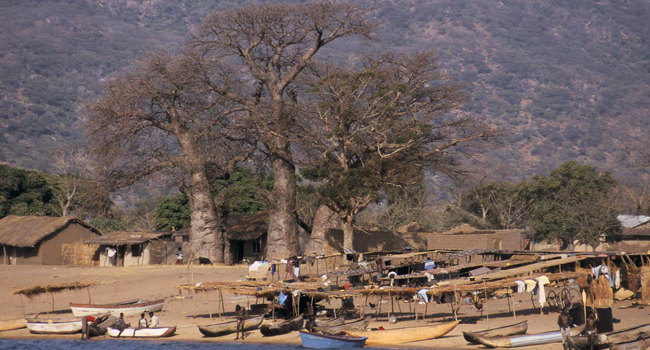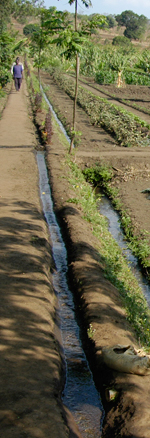
A landlocked country located in south-east Africa, Malawi has abundant natural resources, including good soils and abundant water, wildlife, fisheries and forests, but the dependence of the population on these resources makes them highly vulnerable to climate variability and change. More than 90 per cent of the people of Malawi, mainly resource-poor rural communities, are predominantly engaged in subsistence rain-fed agriculture. Malawi has suffered from a number of adverse climatic hazards events over the last several decades, the most serious of which have been dry spells, seasonal droughts, intense rainfall, riverine floods and flash floods. Some of these, especially droughts and floods, have increased in frequency, intensity and magnitude over the last two decades and have adversely impacted on food and water security, water quality, energy and the sustainable livelihoods of rural and peri-urban resource-poor communities.

Timelines of the NAPA preparation process in Malawi
| Funding for the preparation of the NAPA approved by the GEF |
May 2003 |
| GEF agency approval date |
June 2003 |
| NAPA preparation start |
December 2003 |
| Submission of the NAPA to the UNFCCC |
March 2006 |
NAPA projects under implementation
Malawi listed 15 priority activities in its NAPA, which were then clustered into five project profiles. Due to the importance of agriculture in the country, the first project submitted under the LDCF is aimed at improving resilience to current climate variability and future climate change by developing and implementing adaptation strategies and measures that will improve agriculture production and rural livelihoods. The project is supporting six communities across Malawi.
| Project title: Climate adaptation for rural livelihoods and agriculture (CARLA) |
| Implementing agency |
African Development Bank |
| National executive agency (ies) |
Environmental Affairs Department (EAD) in the Ministry of Mines, Natural Resources and Environment; Department of Irrigation (DoI) in the Ministry of Irrigation and Water Development (MIWD) |
| Cost in USD million (LDCF component/total cost) |
3.255/27.649 (co-financing = 24.394) |
| First submission of the concept note (PIF) under the LDCF |
April 2007 |
| GEF CEO endorsement of the project |
October 2010 |
| Update on progress |
implementation on the ground has not yet started |
NAPA PROCESS
Preparation and implementation strategy: Malawi's NAPA was developed throughout 2004 and 2005, based on a multi-stakeholder approach and with the assistance of UNDP. Eight important economic sectors were analysed (agriculture, water, human health, energy, fisheries, wildlife, forestry and gender) with regard to the impacts of adverse climatic conditions, and 15 priority activities were identified out of 31 adaptation options through a consultative process involving public and private sector organizations, including media, NGOs and civil society. Emphasis was given to vulnerable rural communities of Malawi.
 |
The LDCF project was designed so as to build on baseline activities planned under the existing Smallholder Crop Production and Marketing Project (SCPMP) of the African Development Bank (AfDB), which is aimed at contributing to poverty reduction and food security in rural Malawi. SCPMP comprises three components: irrigation development; a farmers' support programme; and project management and coordination.
Although SCPMP will indirectly contribute to reducing the country's overall vulnerability to current climate variability and climate change, it is not designed to address the urgent and immediate adaptation challenges faced by the country. As such, the aim of the LDCF project was to climate-proof SCPMP by implementing adaptation interventions and fostering the adaptation of individuals, communities and the private sector, on the one hand, and by creating an enabling environment for climate risk management to maximize the positive impacts of investments, sustain their impacts in the long term, and lay the foundation for the replication of best practices beyond the direct project activities, on the other.
The Government of Malawi views the NAPA as a national planning document and, as such, the information provided is used in other national initiatives, such as UNDP's work on sustainable land management, the Green Belt Initiative developed by the Government, research work in tertiary academic institutions and civil society activities.
Institutional arrangements in the country: The country has established a National Climate Change Committee and is currently developing a Climate Investment Plan, which prioritizes the development of an adaptation programme.
Experience with project implementation: The Government of Malawi started working with AfDB on the development of an adaptation project based on two of its NAPA priority activities soon after after submission of the document, in 2006. Although Malawi had not had any previous experience in working with AfDB on a GEF project, the Government selected AfDB to implement the project based on its expertise in projects related to adaptation to climate change in the agricultural sector in other countries. The project received GEF CEO endorsement in October 2010 after several delays related to the agency. Project implementation has not yet started because AfDB is reviewing the project internally to ensure its alignment with the Bank's work plan. The project had already suffered delays from the change in template for project submission by the GEF from a project development facility (PDF) to a PIF/PPG; the whole process from project development to actual implementation has taken over four years. |
Attempts to switch to another GEF agency were unsuccessful, as it is not possible to simply continue the same project with a different agency. GEF procedures require a project to be cancelled and then the whole process has to be restarted (endorsement of a new agency, development of a concept note, a PIF/PPG, etc.) with the new agency, effectively resetting the clock on the project. This process is necessary given the financial agreements for project implementation.
Malawi is implementing additional adaptation activities in the vulnerable areas identified by the NAPA through the Africa Adaptation Programme (AAP), a UNDP programme financed by the Government of Japan, to complement the CARLA project. UNDP is also currently working with the Government of Malawi to develop an LDCF programme focusing on adaptation and land degradation.
Revision and update: Malawi has already initiated a revision of its NAPA to integrate emerging issues.
| Malawi's experience shows how some of the constraints imposed by changing procedures or rigid procedures for accessing resources can result in major delays in the implementation of a project on the ground. |